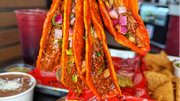Commentary
Food truck marketplaces play a growing role for the emerging food truck industry
Food truck marketplaces help food trucks solve the location problem by securing the rights required for the trucks to operate on their premises. They also market their venues to the public.

May 25, 2017 by Erik Chan — Ceo, OrderParrot
Any food truck veteran will tell you his or her business is all about location. It doesn't matter how great the food is, how cheap it is offered, or what makes it special; location is most highly correlated with sales.
The problem with locations is that securing great ones is hard. Issues relating to permits, regulations and limited availability are typical challenges in securing profitable locations. Over the past few years, this problem gave birth to a new type of business called food truck marketplaces.
Even though food truck marketplaces are relatively recent, chances are you've visited something similar in the past. Event organizers who work with and bring a selection of food trucks together are usually working with food truck marketplaces. Food trucks are the focal point of the business and food truck marketplaces manage fleets of food trucks.
Some food truck marketplaces, such as Spark Social and Soma STrEAT Food Park based in San Francisco, have a fixed location, while others, such as San Jose's Moveable Feast, rotate among multiple locations throughout the week.
The premise is similar; they carefully pick a selection of food trucks to attend their location each day. This arrangement allows the marketplace to offer attendees an ever changing variety of foods and cuisines.
A community experience
"Our venue provides more than just food trucks," said Carlos Muela, owne of Spark Social. "It is a place for the community to get together and enjoy our fire pits and soccer field."
Food truck marketplaces help food trucks solve the location problem by securing the rights required for the trucks to operate on their premises. Additionally, marketplaces market their venue to the public, and decorate their venue with tables, chairs and other dining necessities. This tends to offer them a better chance of gaining a critical mass of attendance than one truck would be able to do alone. And it ultimately allows the food truck operators to spend more time focusing on fulfillment and serving great food.
Food truck marketplaces typically make money via charging the trucks a percentage of sales plus a small fixed fee, and thus aligning all partyies' interests. Oftentimes, food truck marketplaces also act as brokers of their portfolio of food trucks for catering events. Weddings, corporate events, and other one-off event organizers prefer the simplicity of working with the marketplace company instead of each food truck individually.
A public version emerges
In Portland, there is a concept called a Food Cart Pod that is similar to food truck marketplaces. The key difference is that the Pods are usually public space and are not managed by a company.
While the Food Cart Pod may also solve the need of a location for food trucks to gather, the continuing increase in food truck marketplaces is a reflection of their necessity in the food truck ecosystem. It is expected that new food truck marketplaces will continue to pop up around the nation. They offer customers better and more options, and more importantly, they help food trucks offer more than the sum of their parts.
 ChatGPT
ChatGPT Grok
Grok Perplexity
Perplexity Claude
Claude





